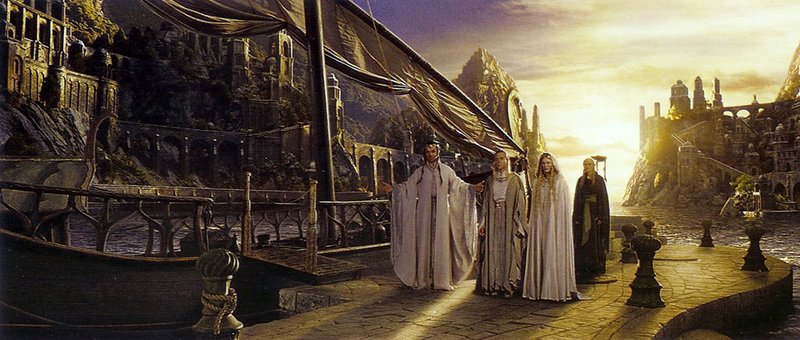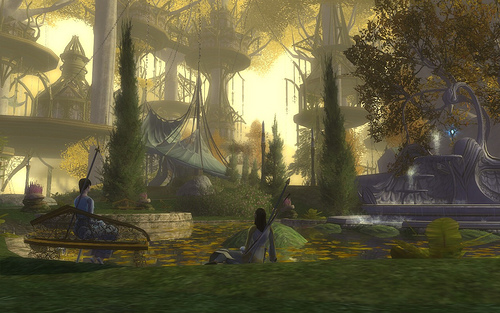HISTORY OF QUENYA
Quenya or High-elven is the most prominent language of the Amanya branch of the Elvish language family. In Aman there were two dialects of Quenya, Vanyarin and Noldorin. For historical reasons, only the latter was used in Middle-earth. The only other Eldarin language spoken in Aman, Telerin, could also be considered a dialect of Quenya, but it was usually held to be a separate language and is not discussed here (see separate article).
Compared to many other Elvish tongues, Quenya was archaic. It preserved the main features of the original Elvish language, invented by the Elves when they first awoke by the mere of Cuiviénen - a tongue with "many...beautiful words, and many cunning artifices of speech" (WJ:422). In fact, the Silmarillion Index refers to Quenya as "the ancient tongue, common to all Elves, in the form it took in Valinor" in Aman - as if Quenya was so similar to Primitive Elvish that it was merely as a later form of it, not a new language. Indeed Primitive Elvish and Quenya may have been mutually intelligible, but it must not be thought that they were almost identical. In Valinor, the ancient Elvish tongue underwent certain changes: "Its altering ...[came] in the making of new words (for things old and new) and in the softening and harmonizing of the sounds and patterns of the Quendian tongue to forms that seemed to the Noldor more beautiful" (WJ:20). The sounds b and d became v and l (or n) initially, final long vowels were shortened, unstressed medial vowels often disappeared, and many consonant clusters underwent metathesis or other changes, generally making them easier to pronounce. Quenya also adopted and adapted a few words from the language of the rulers of Aman - the Valar, the Angelic Powers guarding the world on behalf of its Creator. However, the Valar themselves encouraged the Elves to "make new words of their own style, or...translate the meaning of names into fair Eldarin forms" instead of retaining or adapting Valarin words (WJ:405). It is stated that the Noldor "were changeful in speech, for they had great love of words, and sought ever to find names more fit for all things that they knew or imagined" (Silm. ch. 5).

In Aman, Quenya was spoken not only by the Vanyar and the Noldor, but also by the Valar: "The Valar appear quickly to have adopted Quenya" after the arrival of the Elves, and their own tongue, Valarin, was not often heard by the Eldar: "Indeed it is said that often the Valar and Maiar might be heard speaking Quenya among themselves" (WJ:305). Pengolodh the sage of Gondolin notes: "In the histories the Valar are always presented as speaking Quenya in all circumstances. But this cannot proceed from translation by the Eldar, few of which knew Valarin. The translation must have been made by the Valar or Maiar themselves. Indeed those histories or legends that deal with times before the awakening of the Quendi, or with the uttermost past, or with things that the Eldar could not have known, must have been presented from the first in Quenya by the Valar or the Maiar when they instructed the Eldar." He mentions the Ainulindalë as an example: "It must...have been from the first presented to us not only in the words of Quenya, but also according to our modes of thought." Indeed even Melkor learnt Quenya, and learnt it well. "Alas," Pengolodh notes, "in Valinor Melkor used the Quenya with such mastery that all the Eldar were amazed, for his use could not be bettered, scarce equalled even, by the poets and the loremasters." (VT39:27)
When Rúmil invented letters, Quenya became the first language to be recorded in writing (Silm. ch. 6, LotR Appendix F). But outside the Blessed Realm of Aman, Quenya would never have been known if it had not been for the rebellion of the Noldor in the First Age. Most of this clan left Aman and went into exile in Middle-earth, bringing the High-elven tongue with them. In Middle-earth the Noldor were greatly outnumbered by the native Sindar or Grey-elves, who spoke a clearly related, yet quite different language. The Sindarin tongue had long since dropped the case inflections that were still preserved in Quenya, and the general sound of the two languages differed much - Quenya was much more vocalic than Sindarin and had a very limited distribution of the voiced stops b, d, g, that were frequent in Sindarin. As it turned out, "the Noldor...learned swiftly the speech of Beleriand [i.e. Sindarin], whereas the Sindar were slow to master the tongue of Valinor [i.e. Quenya]". Twenty years after the coming of the Noldor to Middle-earth, "the tongue of the Grey-elves was most spoken even by the Noldor" (Silm. ch. 13). When King Thingol of Doriath finally learnt that the Noldor had killed many of his kinsfolk among the Teleri and stolen their ships when they left Valinor, he banned the use of Quenya throughout his realm. Consequently, "the Exiles took the Sindarin tongue in all their daily uses, and the High Speech of the West was spoken only by the lords of the Noldor among themselves. Yet that speech lived ever as a language of lore, wherever any of that people dwelt" (Silm. ch. 15).
Thus Quenya did survive, even in the dark First Age. In fact, the vocabulary was expanded: The Noldor adopted and adapted some words from other tongues, such as Casar "dwarf" from Dwarvish Khazad and certa "rune" from Sindarin certh (WJ:388, 396). Some words already in use developed new or modified meanings in Exilic Quenya, such as urco, a word that in Valinorean Quenya was used of "anything that caused fear to the Elves, any dubious shape or shadow, or prowling creature" that was remembered in ancient tales of the March from Cuiviénen. In Exilic Quenya, however, urco was recognized as a cognate of Sindarin orch and was used to translate it; hence the meaning of urco was now simply "Orc" (WJ:390; the Sindarin-influenced form orco was also used). When the Edain arrived in Beleriand, they learned not only Sindarin, but "to a certain extent Quenya also" (WJ:410). Though Quenya "was never a spoken language among Men" (Plotz Letter), High-elven names like Elendil became popular among the Edain. Túrin gave himself the Quenya name Turambar or "Master of Doom", and his sister Nienor cried some High-elven words before she killed herself (Silm. ch. 21).

There are also numerous examples of Quenya being used or remembered by the Noldorin Exiles themselves: When Turgon built his hidden city, "he appointed its name to be Ondolindë in the speech of the Elves of Valinor", though the Sindarin-adapted form Gondolin became the usual name of the city. Even in Gondolin, Quenya "had become a language of books" for most people, "and as the other Noldor they used Sindarin in daily speech". Nonetheless, Tuor heard the Guard of Gondolin speak "in the High Speech of the Noldor, which he knew not". It is also stated that "Quenya was in daily use in Turgon's house, and was the childhood speech of Eärendil" (UT:44, 55). PM:348 confirms that "Turgon after his foundation of the secret city of Gondolin had re-established Quenya as the daily speech of his household". Aredhel left Gondolin and was captured by Eöl, to whom she bore a son, and "in her heart she gave him a name in the forbidden tongue of the Noldor, Lómion, that signifies Child of the Twilight" (Silm ch. 16). Eöl later called his son by the Sindarin name Maeglin, but Aredhel "taught Maeglin the Quenya tongue, though Eöl had forbidden it" (WJ:337).
However, Quenya as spoken by the Exiles early underwent some minor changes, probably before Thingol's edict against its use largely froze all processes of linguistic change. In a letter to Dick Plotz, Tolkien described the noun declension of an old form of Quenya, so-called "Book Quenya". Tolkien writes that "as far as was known to [mortal] men - to the Númenorean scholars, and such of these as survived in Gondor in [the Third Age] - these were the forms used in writing". But he further notes: "Quenya as a spoken language had changed to a certain extent among the Noldor before it ceased to be a birth tongue [i.e. early in their exile]... In this 'colloquial' form it continued to be spoken among Elves of Noldorin origin, but was preserved from further change since it was learned anew from writing by each generation." The implication seems to be that also this "colloquial" form of Quenya could be used in writing, and that this was the Quenya of the writings from which each generation learned the language anew. These would be writings written by the Noldor during their exile, after their language had diverged slightly from Amanian Quenya (in particular by the loss of the accusative case): "Exilic conditions...made necessary the writing down anew from memory of many of the pre-Exilic works of lore and song" (PM:332). The Númenorean scholars may have picked up a more archaic form of Quenya because they were in contact with the Eldar of Eressëa and Valinor, not only the Noldorin Exiles in Middle-earth. Today, most writers do not use Book Quenya, but the Exilic Noldorin form of High-Elven, the language of Galadriel's Lament (LotR1/II ch. 8).
The First Age ended in the War of Wrath. At the beginning of the Second Age, some of the Noldor returned to Aman, "but some lingered many an age in Middle-earth" (Silm. ch. 24). Thus, native speakers of Quenya were still present in the Hither Lands. Indeed even their greatest enemy made a Quenya name for himself when he appeared to the Elves in a fair form to deceive them: Annatar, the Lord of Gifts (Of the Rings of Power in Silm). His real name was also Quenya, but one may well understand that he did not like it: Sauron, the Abhorred (see Silm. Index). Later, the Smiths of Eregion gave Quenya names to their greatest works: Narya, Nenya, and Vilya, the greatest of the Rings of Power save the One Ring itself.

However, the history of the Second Age is dominated by the saga of Númenor, the great isle given to the Edain by the Valar. Originally all the Edain were Elf-friends, and most of them knew Sindarin (though the daily speech of the Númenóreans was Adûnaic, a Mannish tongue). We are told that "the lore-masters among them learned also the High Eldarin tongue of the Blessed Realm, in which much story and song was preserved from the beginning of the world... So it came to pass that, beside their own names, all the lords of the Númenóreans had also Eldarin [Quenya and/or Sindarin] names; and the like with the cities and fair places that they founded in Númenor and on the shores of the Hither Lands" (Akallabêth). Examples of Quenya names in Númenor include Meneltarma, Armenelos, Rómenna and the name Númenor itself. Yet the fact remained that "Quenya was not a spoken tongue in Númenor. It was known only to the learned and to the families of high descent, to whom it was taught in their early youth. It was used in official documents intended for preservation, such as the Laws, and the Scroll and the Annals of the Kings..., and often in more recondite works of lore. It was also largely used in nomenclature: the official names of all places, regions, and geographical features in the land were of Quenya form (though they usually had also local names, generally of the same meaning, in either Sindarin or Adúnaic [Númenorean]. The personal names, and especially the official and public names, of all members of the royal house, and of the Line of Elros in general, were given in Quenya form" (UT:216). The Kings took Quenya names because High-Elven was "the noblest tongue in the world" (UT:218). However, times would change.
The Númenoreans began to envy the immortality of the Elves, and the friendship with Aman gradually became cold. When the twentieth King of Númenor ascended the throne in the year 2899 of the Second Age, he broke with the ancient custom and took the sceptre with a title in Adûnaic instead of Quenya: Ar-Adûnakhôr, Lord of the West. In his reign "the Elven-tongues were no longer used, nor permitted to be taught, but were maintained in secret by the Faithful; and the ships from Eressëa came seldom and secretly to the west shores of Númenor thereafter" (UT:222). In 3102 Ar-Gimilzôr became the twenty-third King, and "he forbade utterly the use of the Eldarin tongues, and would not permit any of the Eldar to come to the land, and punished those that welcomed them" (UT:223). Indeed "the Elvish tongues were proscribed by the rebel Kings, and Adûnaic alone was permitted to be used, and many of the ancient books in Quenya or in Sindarin were destroyed" (PM:315).
However, Gimilzôr's son Inziladûn proved to be of a very different character when he became King in 3177 (or 3175 according to one source - see UT:227). He repented of the ways of the Kings before him and took a title in Quenya according to the ancient custom: Tar-Palantir, the Far-Sighted. Tar-Palantir "would fain have returned to the friendship of the Eldar and the Lords of the West", but it was too late (UT:223). His only child, a daughter, he named Míriel in Quenya. She should have been Ruling Queen after his death in 3255, but she was forced to marry Pharazôn, son of Tar-Palantir's brother Gimilkhâd. Pharazôn took her to wife against her will to usurp the sceptre of Númenor. Evidently he could not stand her Quenya name and changed it to Zimraphel in Adûnaic. Proud and arrogant, Ar-Pharazôn challenged Sauron in Middle-earth. The evil Maia cunningly pretended to surrender, whereupon Pharazôn "in the folly of his pride carried him back as a prisoner to Númenor. It was not long before he had bewitched the King and was master of his counsel; and soon he had turned the heart of all the Númenoreans, except the remnant of the Faithful, back towards the darkness" (LotR Appendix A). Sauron made the King believe that he would become immortal if he managed to wrest the rulership of Aman from the Valar, and eventually Pharazôn did attempt to invade the Blessed Realm. As Sauron well knew, the Númenoreans could never conquer the Powers, and as he had foreseen, Pharazôn's armada was utterly defeated. However, Sauron had not foreseen that the Valar would call upon the One Himself, and that He would use His power to change the entire shape of the world. The Blessed Realm was removed from the visible world into the realm of hidden things, and with it went all native speakers of Quenya save those of the Noldor who lingered in Middle-earth. Númenor itself disappeared in the sea, and we shall never know the number of the books written in Quenya that were lost in the ruin of the Isle of the Kings. The sunken isle was given new High-elven names: Mar-nu-Falmar, Land (lit. Home) under Waves, and Atalantë, the Downfallen.

The only survivors of the Downfall were Elendil, Isildur, Anárion and those who followed them on their ships. As their Quenya names give away, they were Elf-friends and had no part in the rebellion against the Valar. In Middle-earth they founded the Realms in Exile, Arnor and Gondor. Sauron soon attacked Gondor, but he was defeated in the Battle of Dagorlad, and after seven years of siege he had to leave the Barad-dûr and was slain by Gil-galad, Elendil, and Isildur; only the last of these survived. So ended the Second Age of the World, but the Realms in Exile survived into the Third Age, and among the scholars of Arnor and Gondor the knowledge of Quenya was preserved.
The Kings of Arnor and Gondor used Quenya names, as had the faithful Númenorean Kings of old. (861 years into the Third Age, however, Arnor was divided into the petty realms of Arthedain, Rhudaur, and Cardolan; the Kings of these realms used Sindarin names.) The Stewards of Gondor also used Quenya names until the time of Mardil, the first of the Ruling Stewards (so called because there was no King in Gondor in the period 2050-3019 of the Third Age, and the Stewards had to take on all responsibilities). However, Mardil's successors ceased to use High-elven names. The Stewards never took the title of King, and they may have thought it would be presumptuous to use Quenya names after the manner of the Kings. But when Aragorn was crowned King in 3019, he called himself Elessar Telcontar in Quenya, following the ancient custom. Then the Fourth Age began, and the last of the Noldor set sail from the Havens and left Middle-earth for ever, returning to Aman. The last native speakers of Quenya were gone from our world, but as Gandalf pointed out to Aragorn, it was his task "to preserve what may be preserved" (LotR3/VI ch. 5) - including the knowledge of the Eldarin languages. We know that Aragorn gave a High-elven name to his son Eldarion, who succeeded him on the throne of Gondor when he died in the year 120 of the Fourth Age. Though little is known about this Age, there can be little doubt that as long as the realm of Gondor endured, Quenya was remembered.

